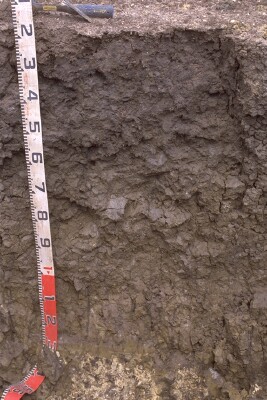SW85
Location: Warncoort
Australian Soil Classification: Vertic (& Calcic), Subnatric, Grey SODOSOL
General Landscape Description: Gently undulating plain.
Site Description: Alluvial plain.
Geology: Alluvium in basalt plain (Qrm).
Soil Profile Morphology:
Surface Soil
| Ap | 0-10 cm | Very dark grayish brown (10YR3/2 moist); clay loam fine sandy; pH 5.7: |  SW85 Profile. Note: Surface (A1) horizon has been stripped from the profile |
| A2 | 10-25 cm | Very dark grayish brown (10YR3/2 moist), conspicuously bleached (10YR6/2 dry); clay loam fine sandy;rusty root channel mottling; pH 5.9; abrupt change to: | |
| Subsoil | |||
| B21t | 25-65 cm | Dark gray (10YR4/1 moist); heavy clay; occasional coarse prismatic, parting to irregular moderate blocky structure; mixed rough and smooth faced peds; strong consistence dry; pH 7.4; gradual change to: | |
| B22ss | 65-100 cm | Light olive brown (2.5Y5/3 moist) to grayish brown (2.5Y5/2 moist); heavy clay; strongly vertic large slickensides present; pH 9.0; gradual change to: | |
| B23ss | 100-130 cm | Light olive brown (2.5Y5/4 moist); light medium clay; coarse lenticular, parting to fine lenticular structure; very large slickensides; pH 9.1; sharp change to: | |
| B24k | 130 cm+ | Light brownish gray (2.5Y6/2 moist); brownish yellow (10YR6/8 moist) mottles; soft carbonate and hard silica rich calcium carbonate nodules; pH 9.3: |
Key Profile Features:
- Strong texture contrast between surface (A) horizons and subsoil (B21) horizon.
- Vertic properties in deeper subsoil (i.e. slickensides and lenticular peds).
Soil Profile Characteristics:
pH | Salinity Rating | |||
Surface (A1 horizon) | Moderately Acid | Low | Non-Sodic | None1 |
Subsoil (B21 horizon) | Slightly Alkaline | Low | Sodic | Complete |
Deeper Subsoil (at 65-100 cm) | Strongly Alkaline | Medium-High | Strongly Sodic | Complete |
| 1 Moderate dispersion after remoulding. | ||||

| The surface soil is strongly acid. The subsoil is slightly acid becoming strongly alkaline with depth. | Salinity rating is low in the surface becoming very low in the subsoil. | The soil is non sodic in the surface. The upper subsoil is sodic becoming strongly sodic in the deeper subsoil. | The clay content increases markedly at the A/B boundary. |
Horizon | Horizon Depth (cm) | pH (water) | pH (CaCl2) | EC 1:5 | NaCl % | Exchangeable Cations | |||
Ca | Mg | K | Na | ||||||
meq/100g | |||||||||
A1 | 0-10 | 5.7 | 4.7 | 0.1 | 2.8 | 4.8 | 0.34 | 0.77 | |
A2 | 10-25 | 5.9 | 4.7 | 0.09 | 2.2 | 4.6 | 0.24 | 0.9 | |
B21 | 25-65 | 7.4 | 6.2 | 0.18 | 4.4 | 14 | 0.72 | 3.3 | |
B22 | 65-100 | 9 | 8.4 | 0.86 | 0.11 | 5.7 | 19 | 0.6 | 8.6 |
B23 | 100-130 | 9.1 | 8.5 | 0.85 | 0.11 | ||||
B24 | 130+ | 9.3 | 8.5 | 0.77 | 0.1 | ||||
Horizon | Horizon Depth (cm) | Organic Carbon % | Nitrogen % | Exchangeable Aluminium mg/kg | Exchangeable Acidity meq/100g | Field Capacity pF2.5 | Wilting Point pF4.2 | Coarse Sand (0.2- 2.0 mm) | Fine Sand (0.02- 0.2 mm) | Silt (0.002- 0.02 mm) | Clay (<0.002 mm) |
A1 | 0-10 | 2.6 | 0.2 | 13 | 10 | 28.4 | 11.1 | 21 | 35 | 15 | 21 |
A2 | 10-25 | <10 | 8.8 | 26.1 | 9.6 | 17 | 40 | 19 | 19 | ||
B21 | 25-65 | 35.7 | 16.4 | 16 | 33 | 16 | 31 | ||||
B22 | 65-100 | 55.8 | 26.7 | 7 | 18 | 13 | 56 | ||||
B23 | 100-130 | ||||||||||
B24 | 130+ |
Management Considerations:
Subsoil (B) Horizons
- The dense and coarsely structured subsoil is sodic and disperses completely. This will result in significantly restricted root and water movement into the subsoil.
- The subsoil displays vertic features (i.e. slickensides) which indicates that significant shrinking and swelling occurs during wetting and drying cycles. This may have engineering implications and is likely to explain the variability in surface horizon depth across the trench.
Profile Described By: Richard McEwan (March 1999).


